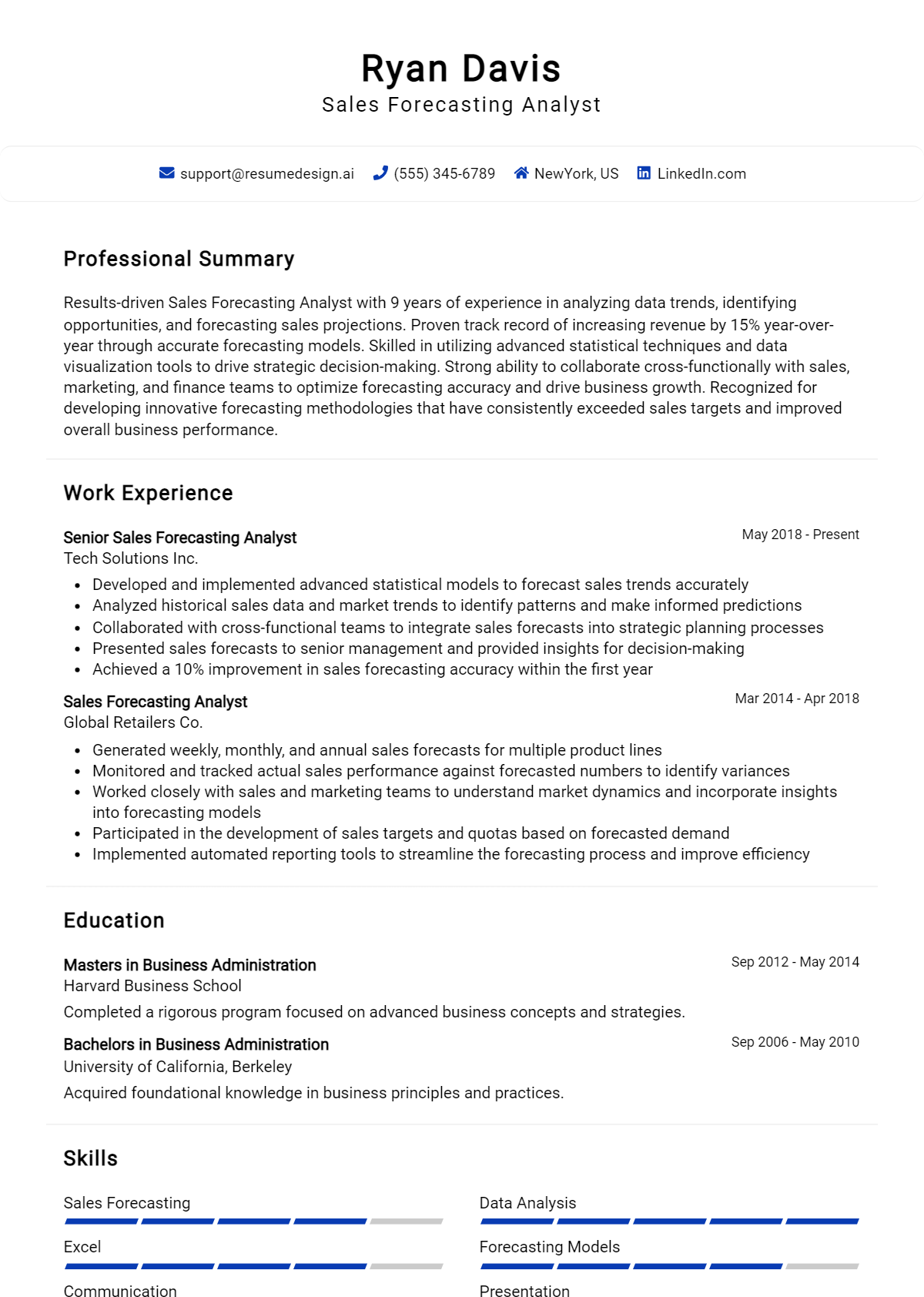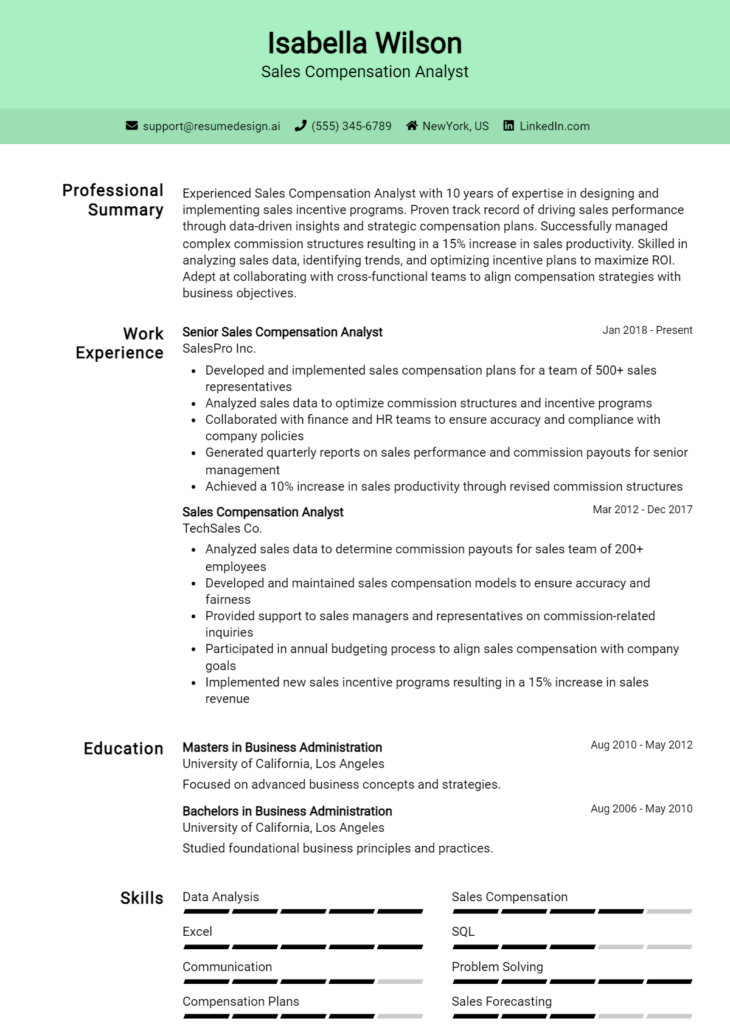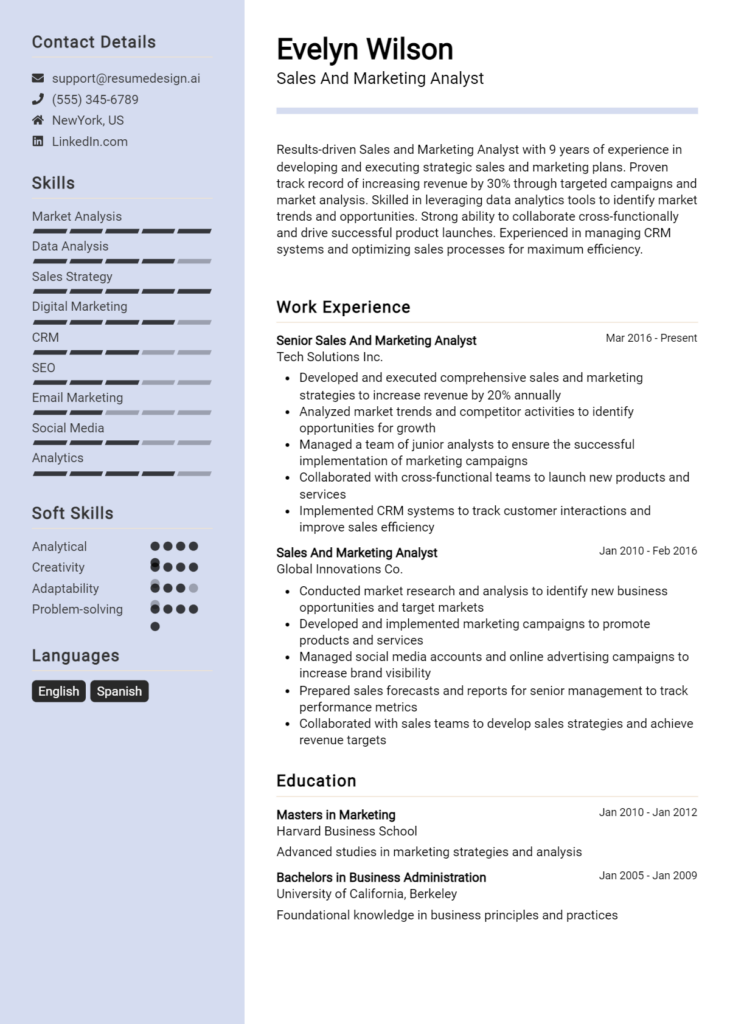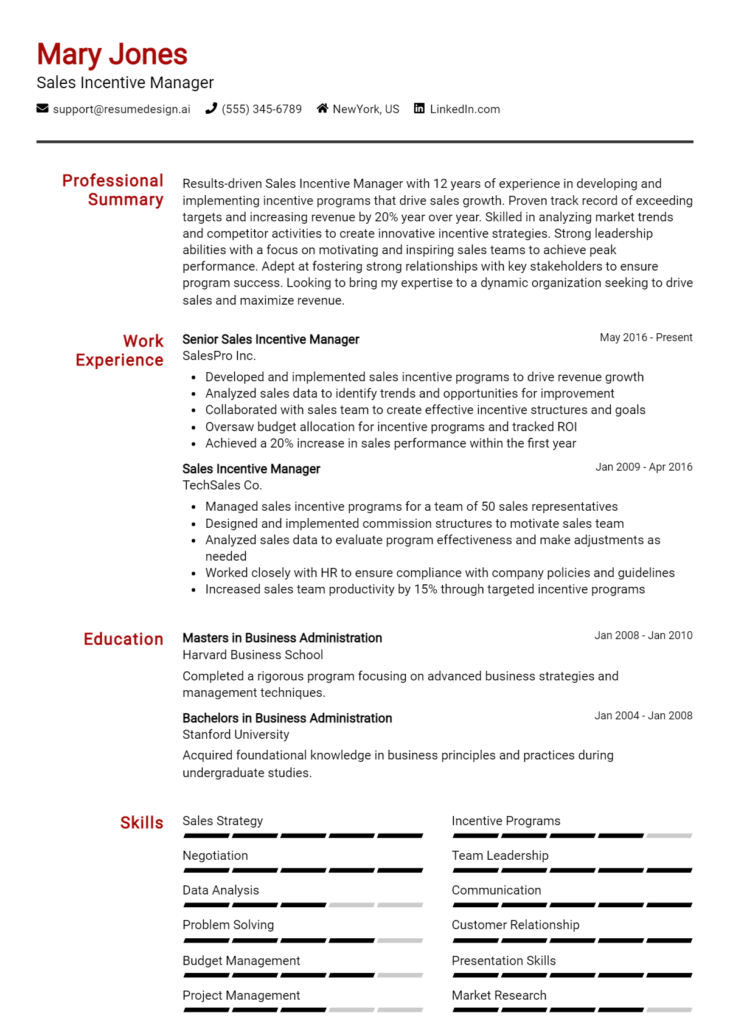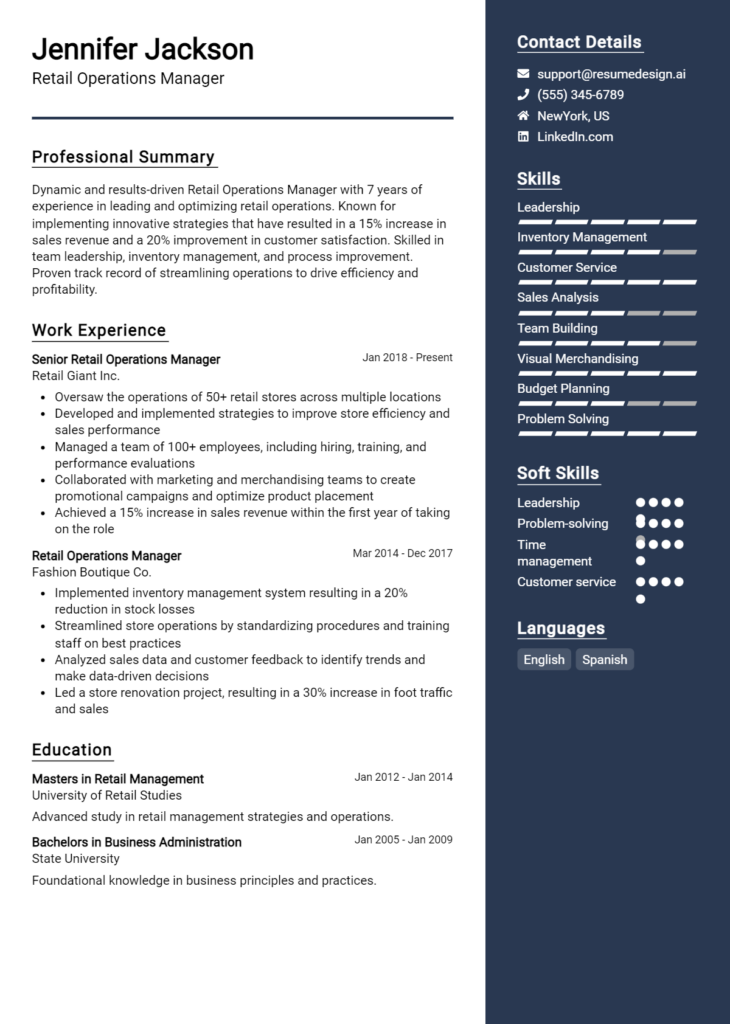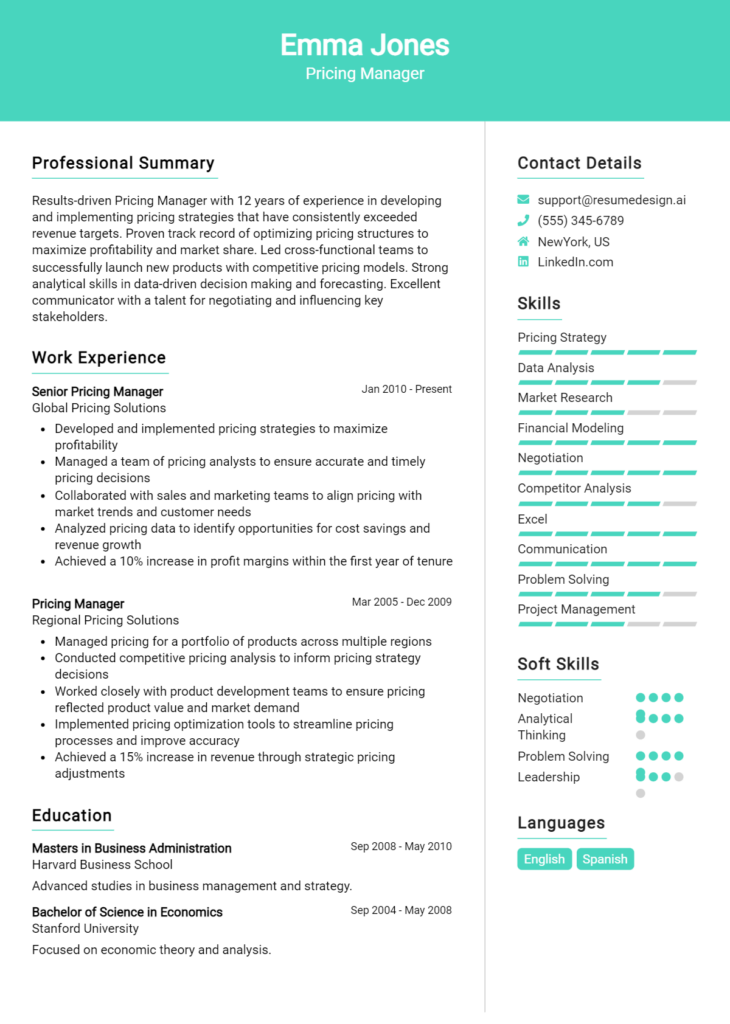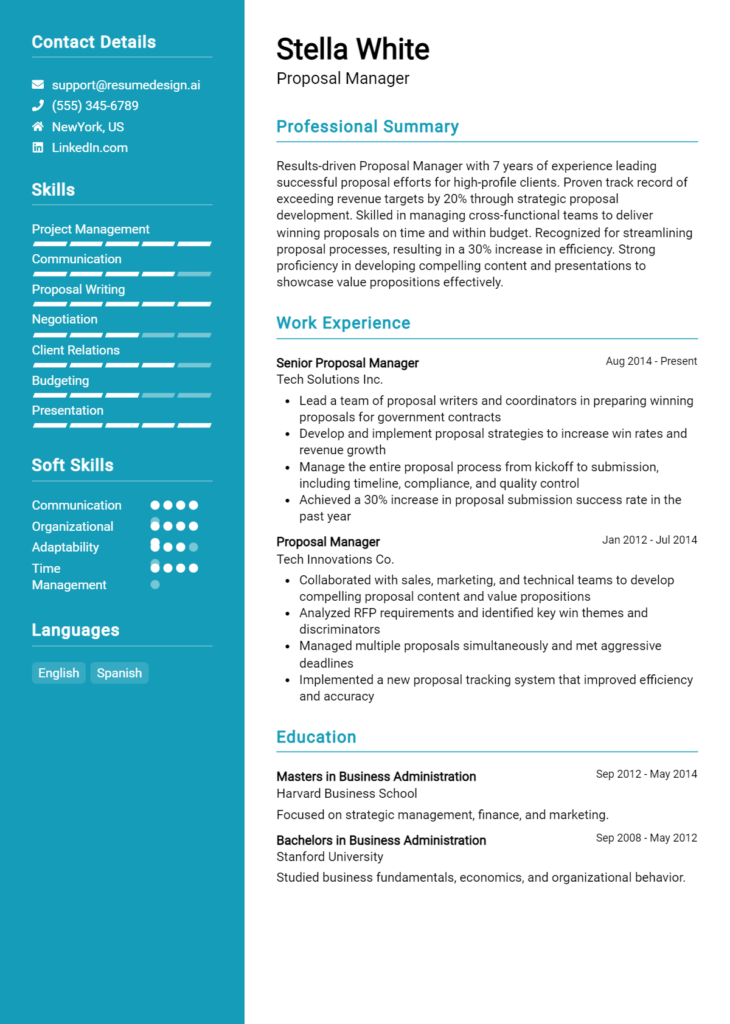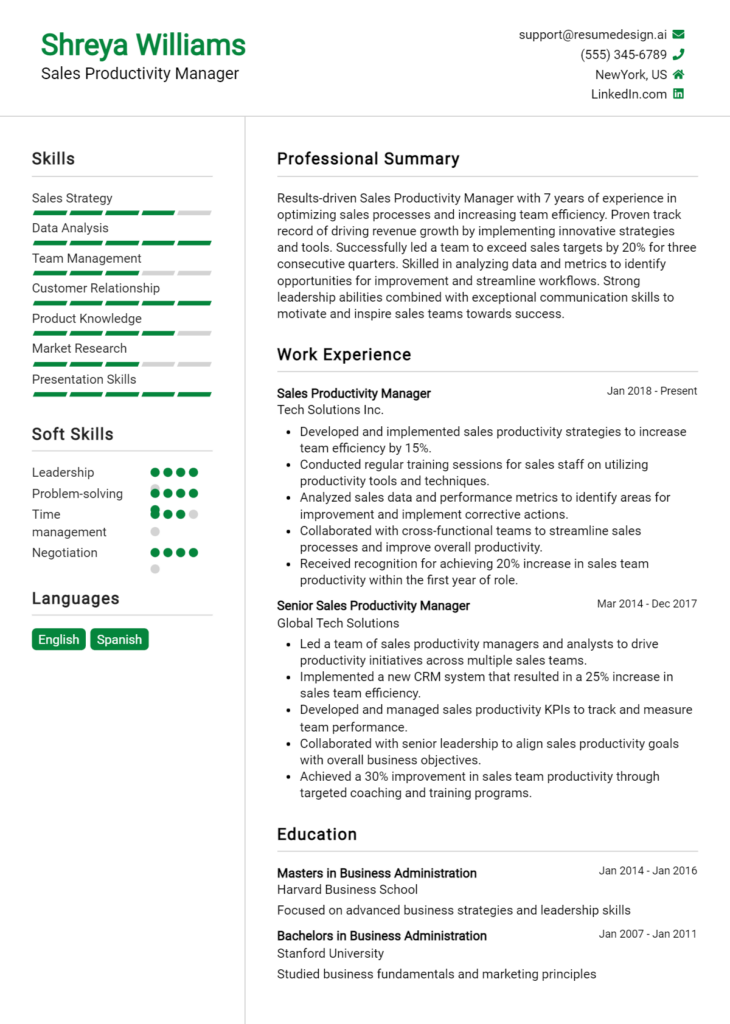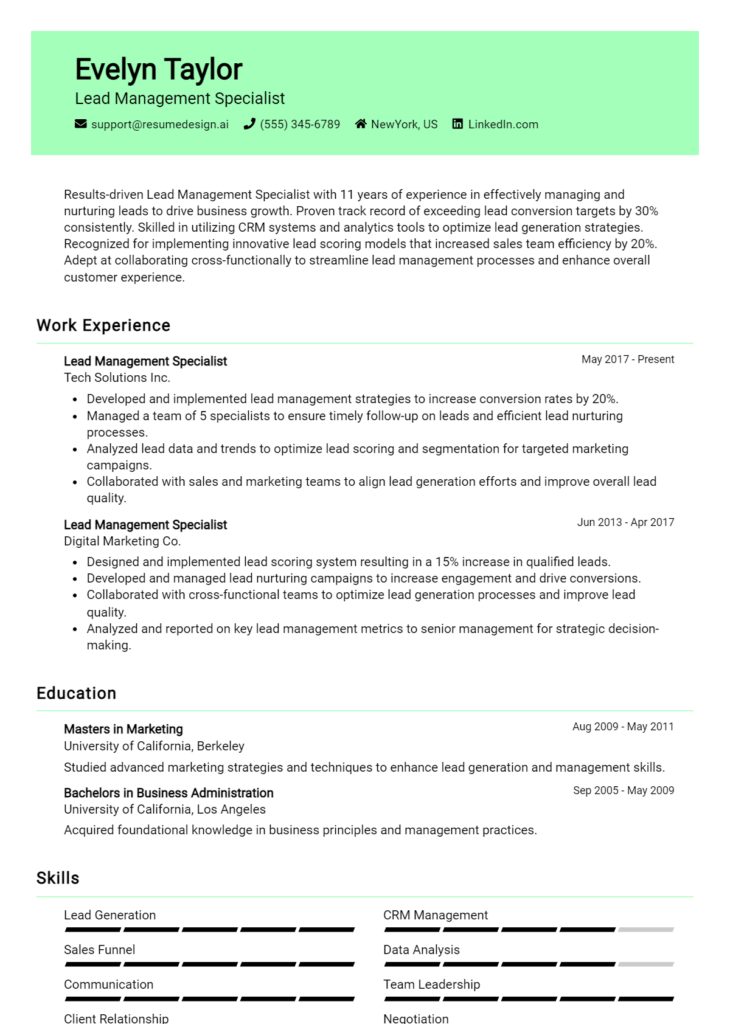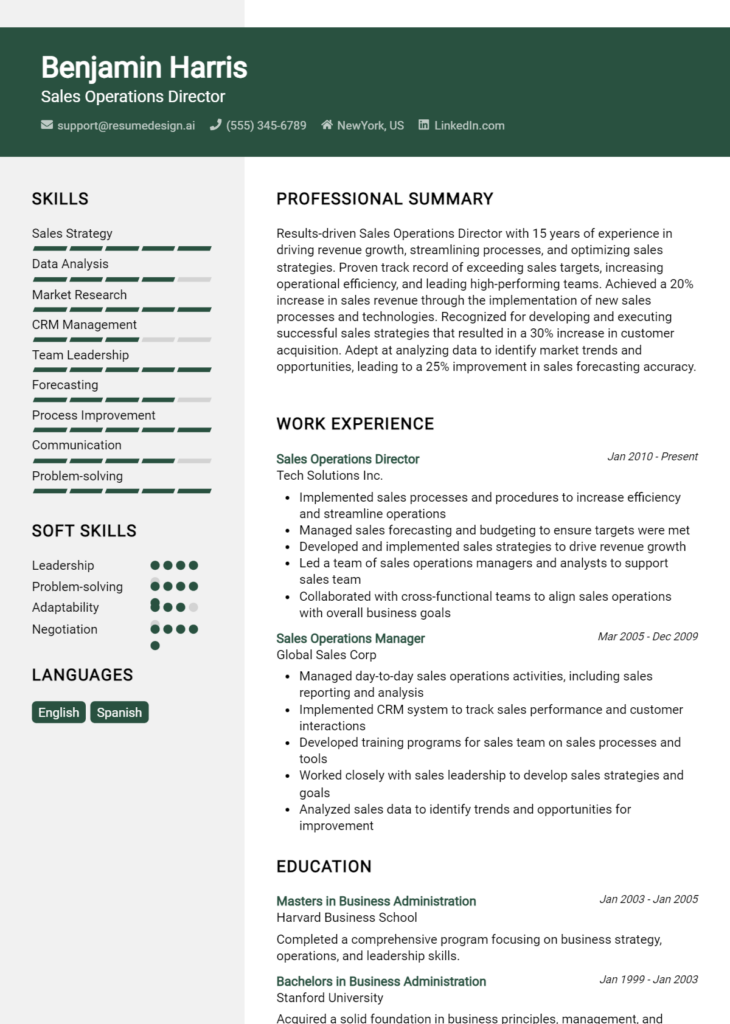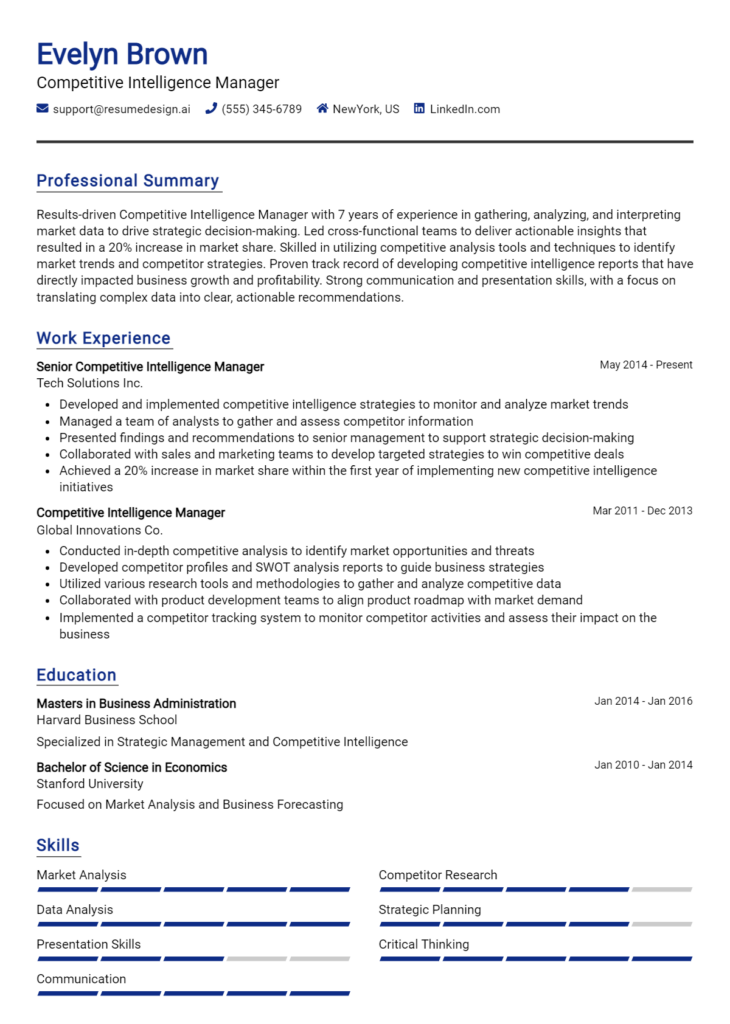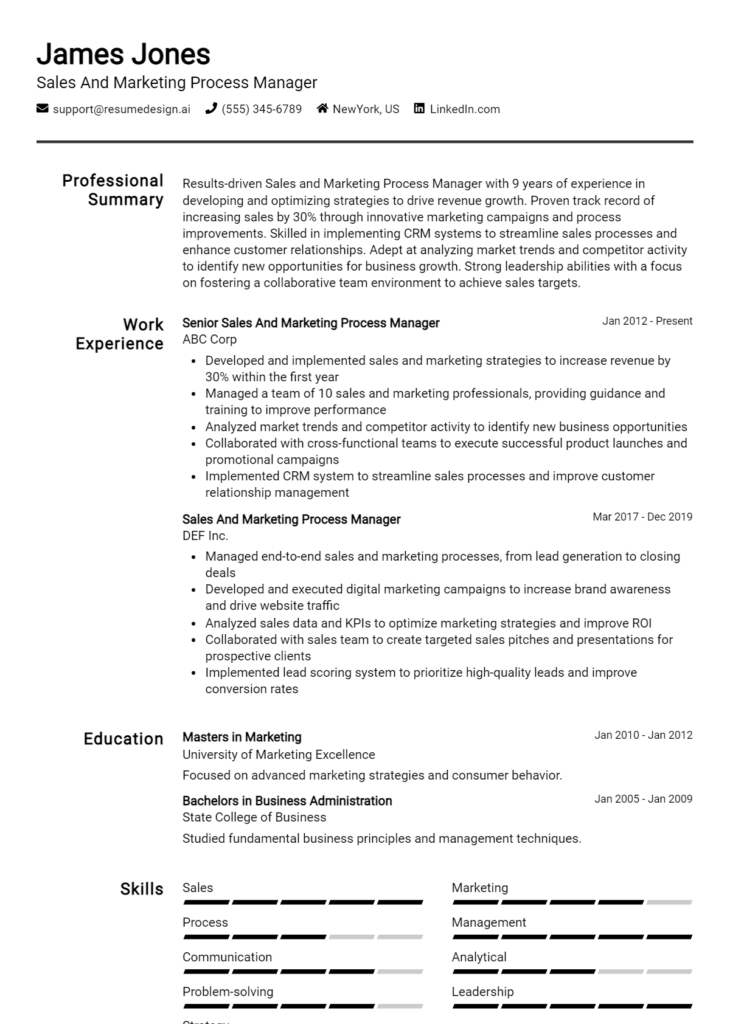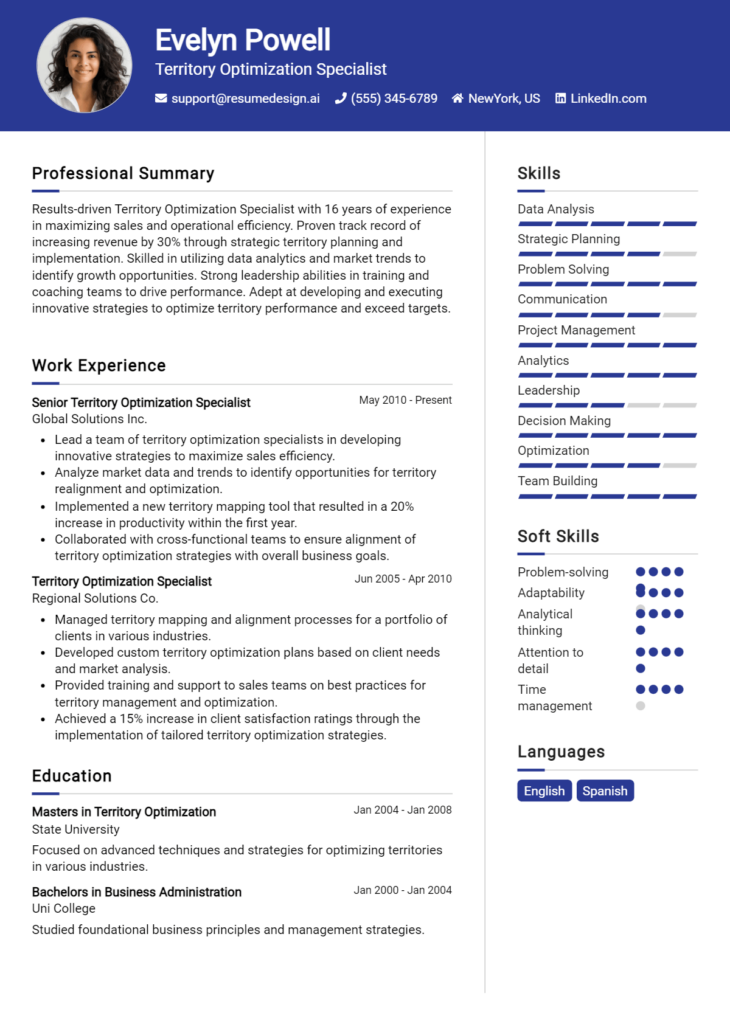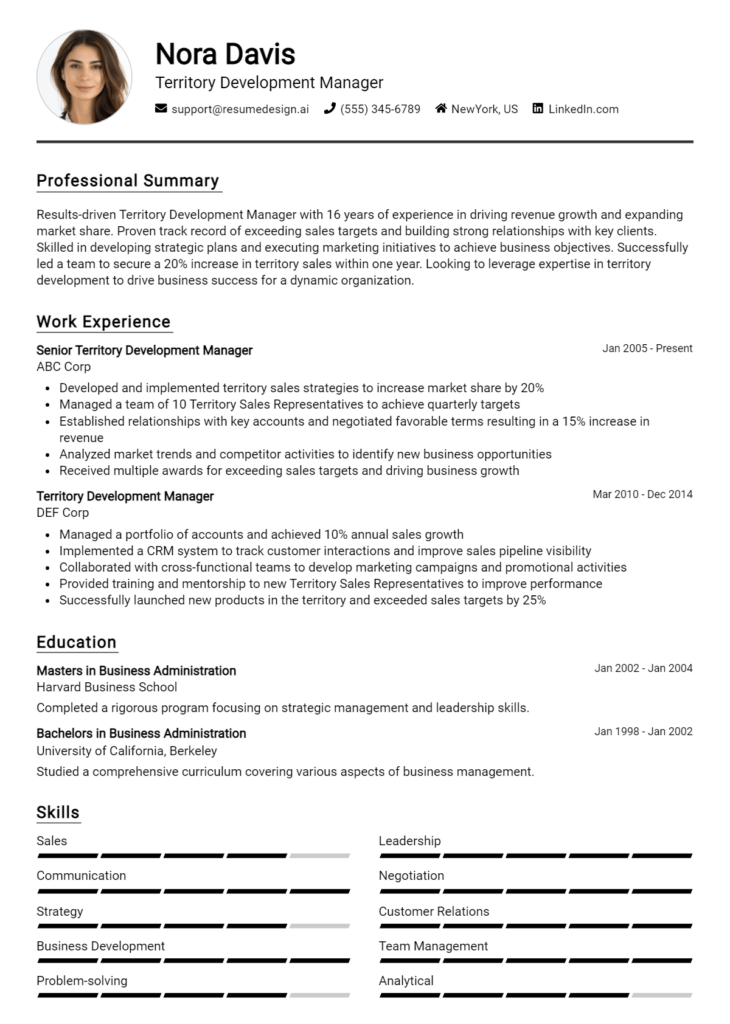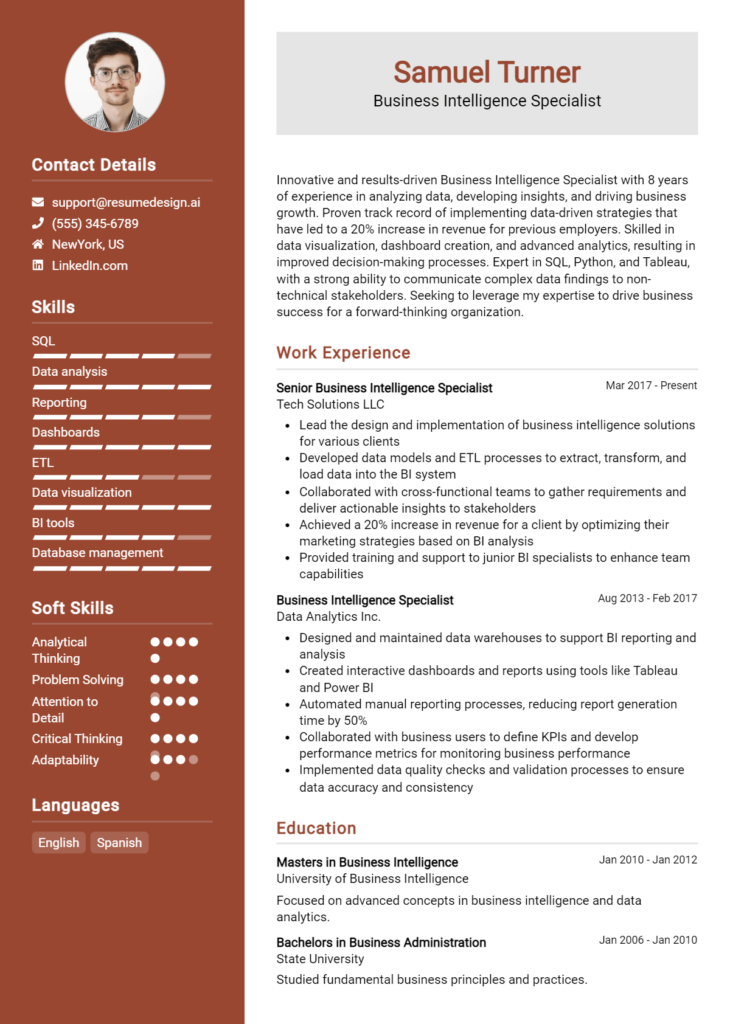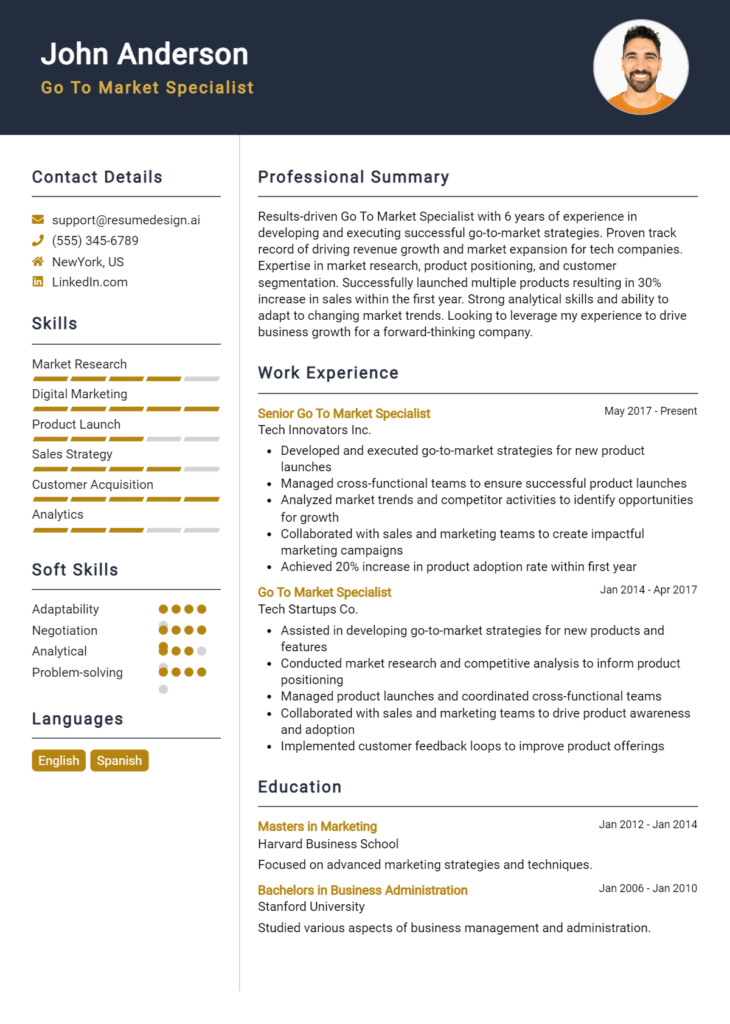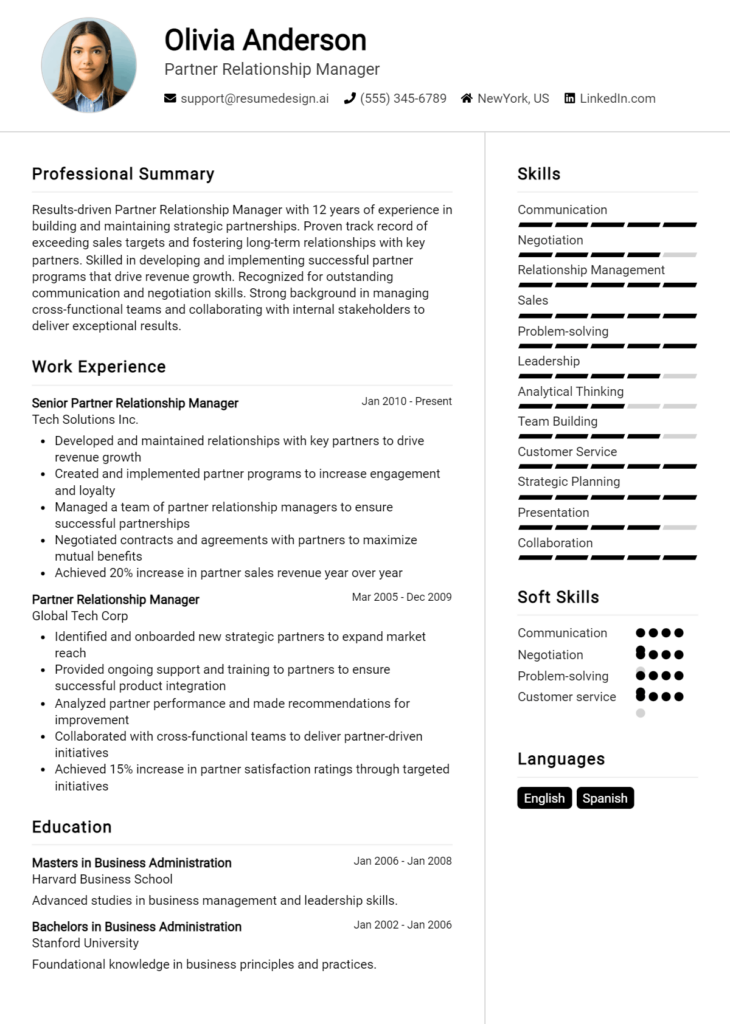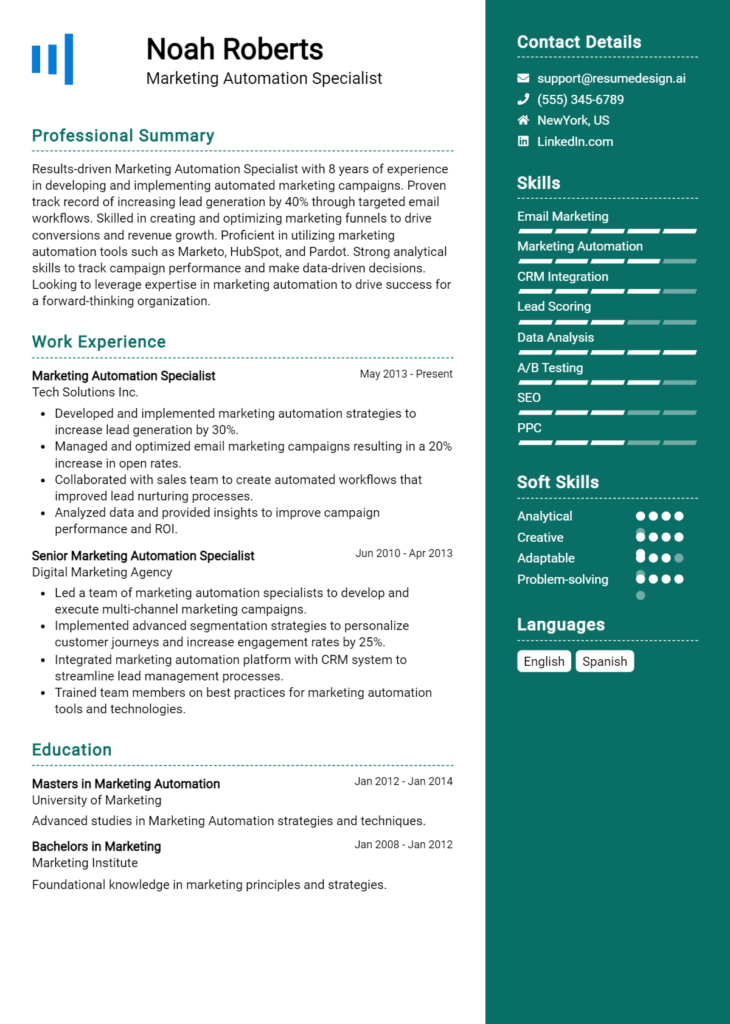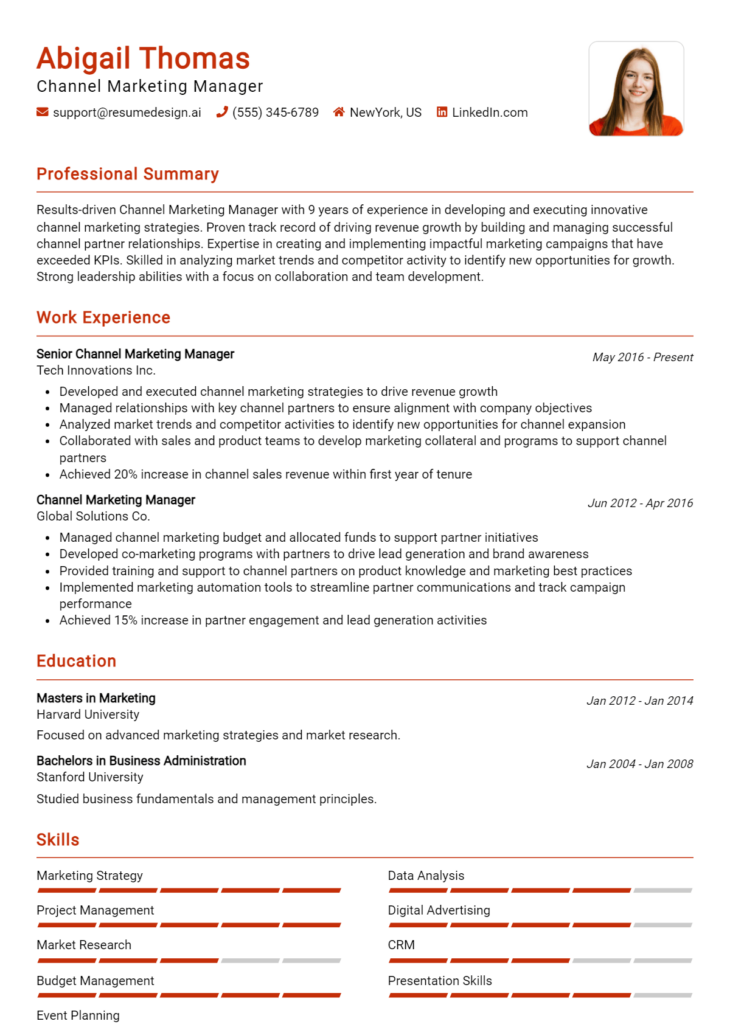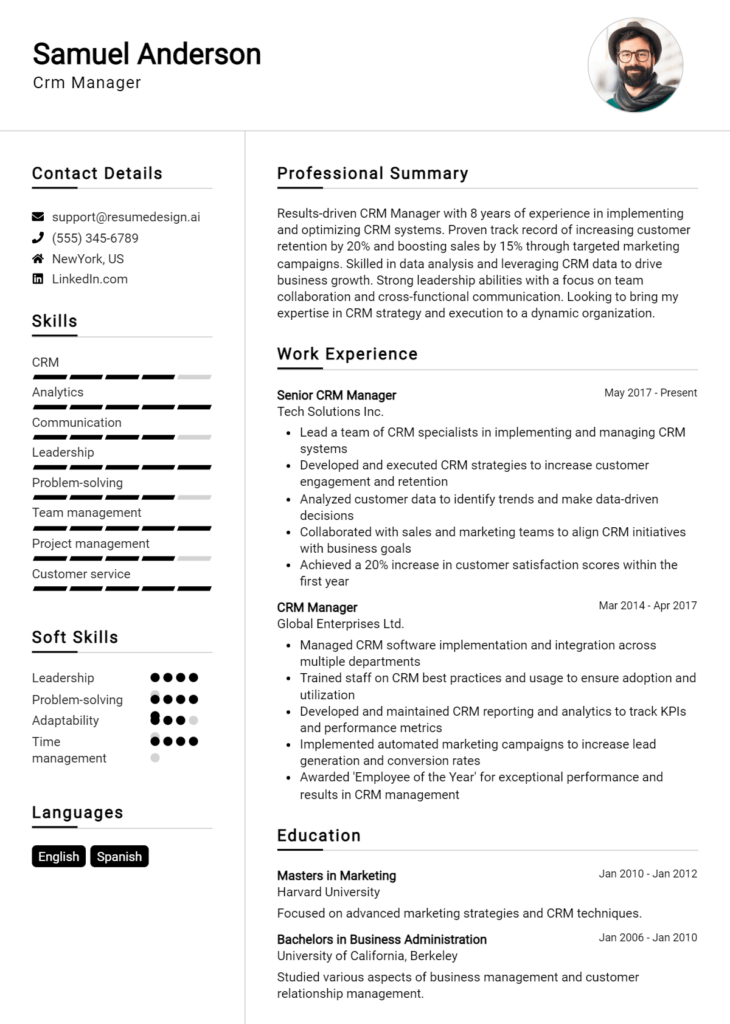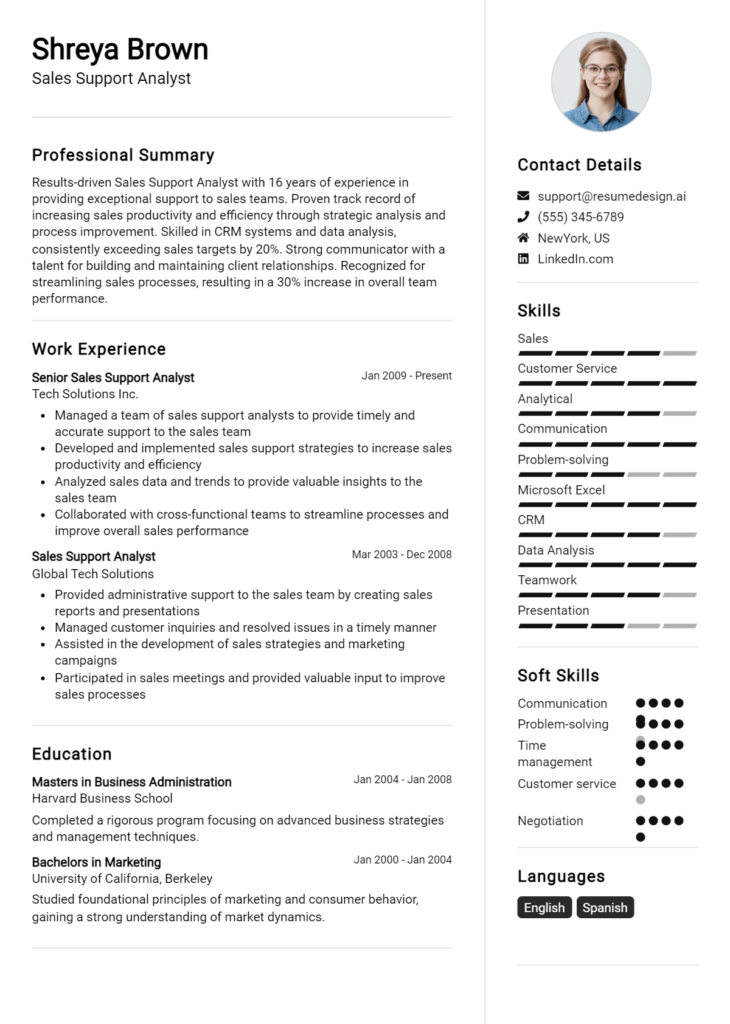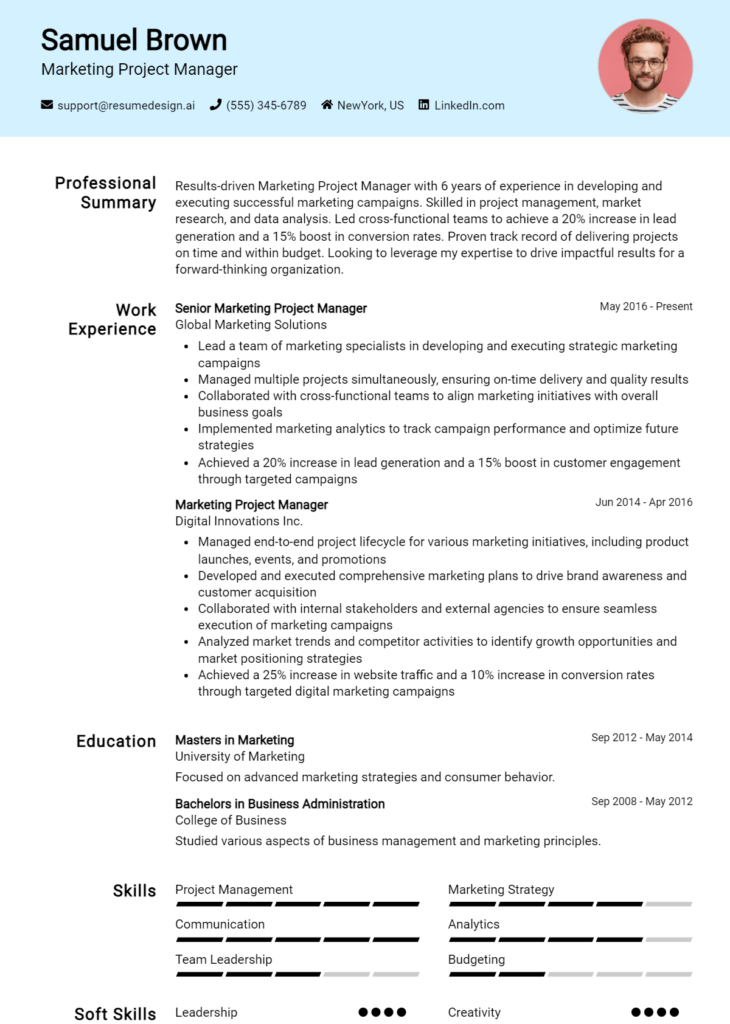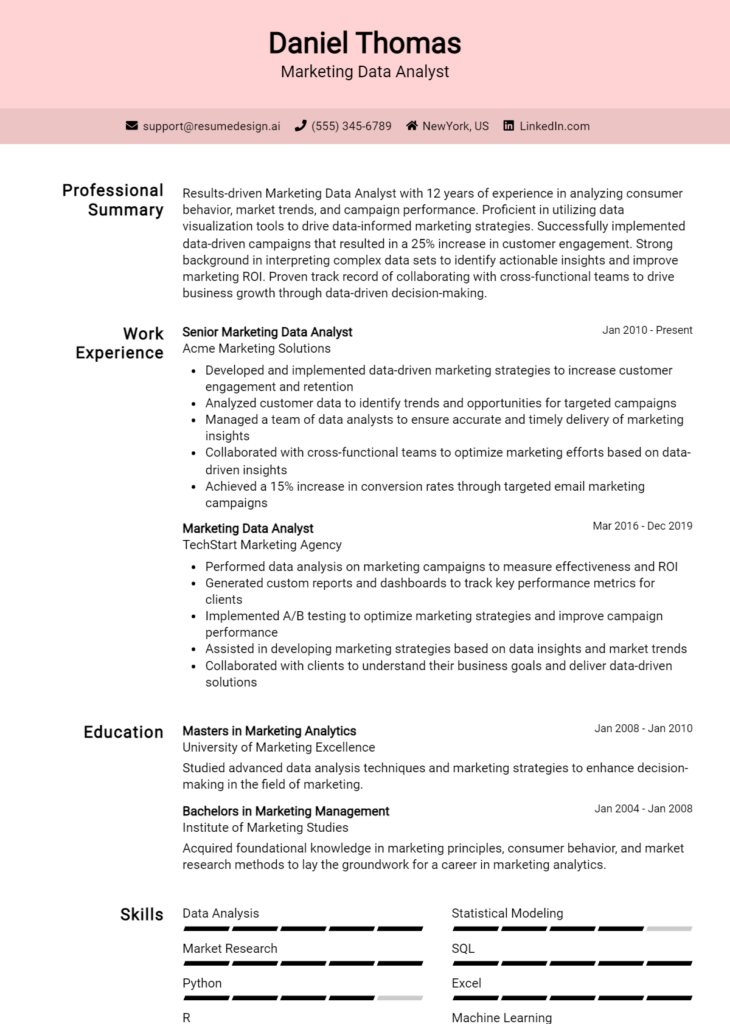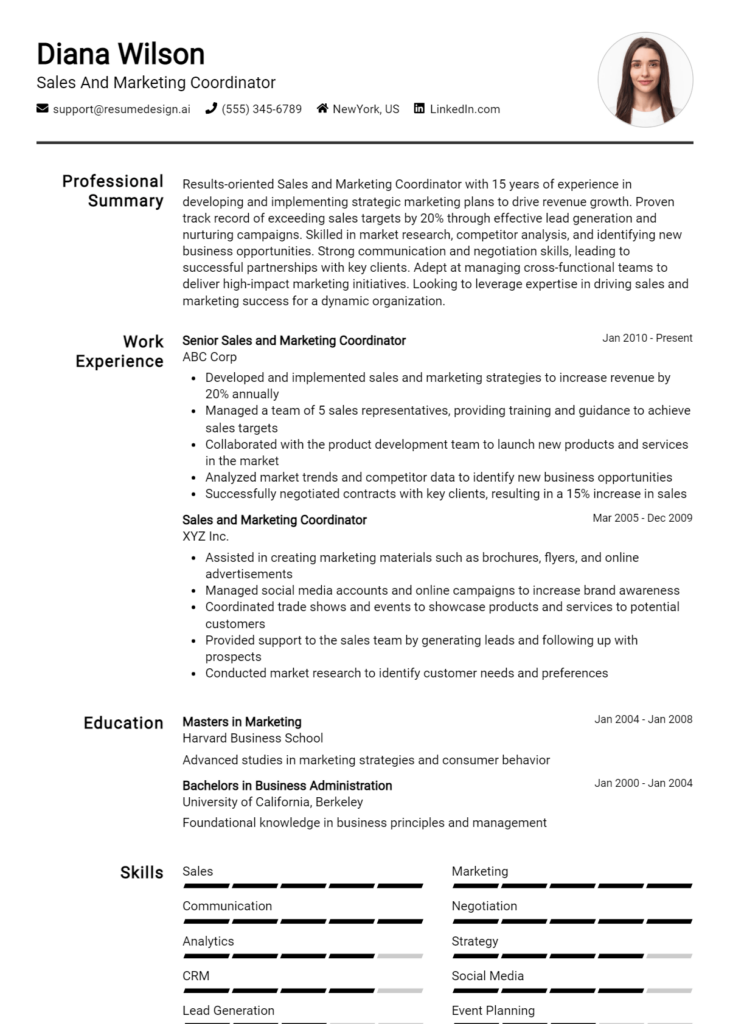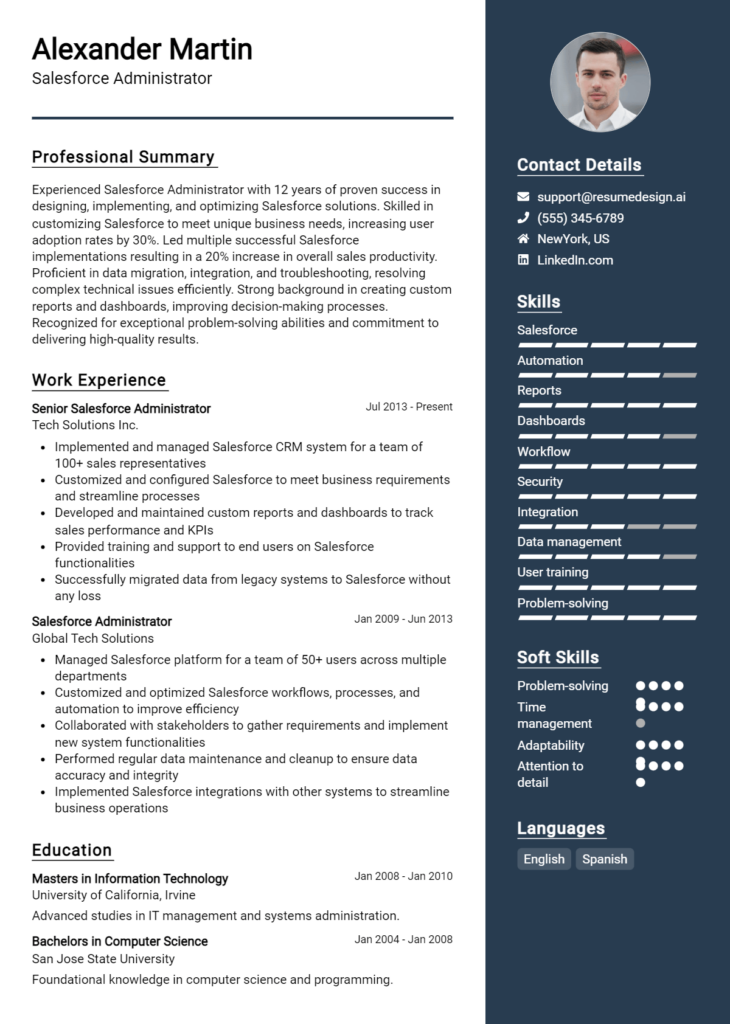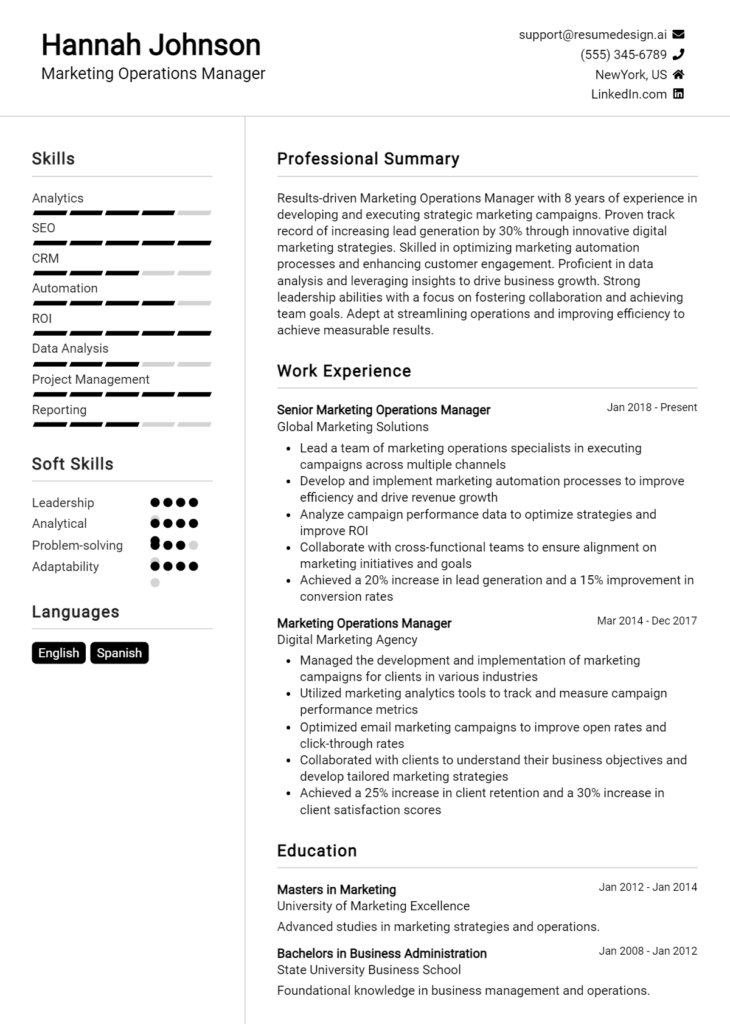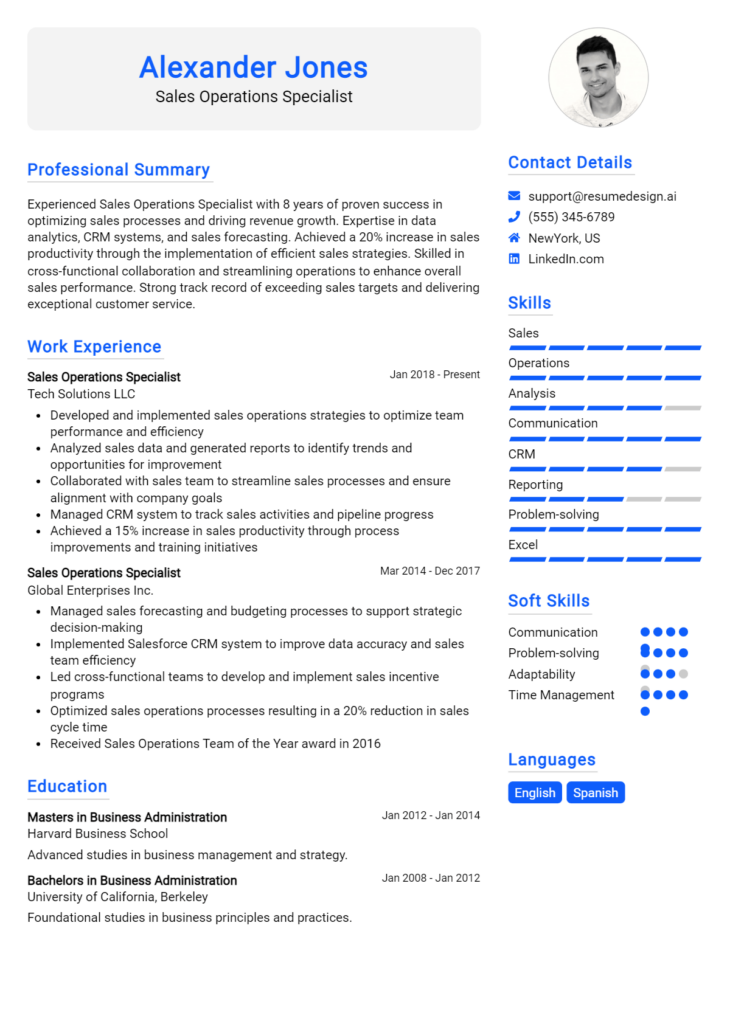Sales Forecasting Analyst Core Responsibilities
A Sales Forecasting Analyst plays a crucial role in bridging various departments by analyzing sales trends, developing accurate forecasts, and collaborating with marketing, finance, and operations teams. Key responsibilities include data analysis, reporting, and presenting findings to stakeholders. Essential skills encompass technical proficiency in analytics tools, operational insight into market dynamics, and strong problem-solving abilities. These competencies are vital for aligning sales strategies with organizational goals, and a well-structured resume can effectively highlight these qualifications to potential employers.
Common Responsibilities Listed on Sales Forecasting Analyst Resume
- Analyze historical sales data to identify trends and patterns.
- Develop and maintain accurate sales forecasts based on market analysis.
- Collaborate with cross-functional teams to gather input and insights.
- Prepare and present reports summarizing forecast results and recommendations.
- Utilize statistical models and forecasting tools for data analysis.
- Monitor inventory levels to align with forecasted sales.
- Identify potential risks and opportunities within sales projections.
- Conduct market research to inform forecasting strategies.
- Assist in the development of sales budgets and strategic plans.
- Provide training and support to team members on forecasting methodologies.
- Continuously improve forecasting processes and methodologies.
- Communicate findings and insights to senior management for decision-making.
High-Level Resume Tips for Sales Forecasting Analyst Professionals
In today's competitive job market, a well-crafted resume serves as a critical tool for Sales Forecasting Analyst professionals seeking to make their mark. It's often the first impression a candidate makes on potential employers, making it essential that the resume not only highlights relevant skills and experiences but also conveys a track record of achievements in the field. A strong resume can effectively communicate your analytical prowess and industry knowledge, setting you apart from the competition. This guide will provide practical and actionable resume tips specifically tailored for Sales Forecasting Analyst professionals, enabling you to present your qualifications in the best possible light.
Top Resume Tips for Sales Forecasting Analyst Professionals
- Tailor Your Resume: Customize your resume for each application by aligning your skills and experiences with the specific job description.
- Highlight Relevant Experience: Focus on roles and projects that are directly related to sales forecasting, data analysis, and market research.
- Quantify Achievements: Use specific metrics to demonstrate your impact, such as percentage increases in sales accuracy or reductions in forecasting errors.
- Showcase Technical Skills: Emphasize proficiency in relevant software and tools, such as Excel, SQL, and CRM systems, which are crucial for data analysis.
- Include Industry Knowledge: Incorporate insights about market trends, consumer behavior, and economic factors that demonstrate your deep understanding of the sales landscape.
- Utilize Action Verbs: Start bullet points with strong action verbs like "analyzed," "developed," or "optimized" to convey a sense of initiative and impact.
- Keep it Concise: Aim for a clean, concise format; ideally, your resume should not exceed one page, ensuring that it is easy for hiring managers to read.
- Proofread for Accuracy: Ensure that your resume is free from grammatical errors and typos, as attention to detail is critical in a forecasting role.
- Include Certifications: If applicable, mention any relevant certifications or training that can enhance your credibility as a Sales Forecasting Analyst.
- Leverage Keywords: Research and incorporate industry-specific keywords from the job description to improve your chances of passing through applicant tracking systems (ATS).
By implementing these tips, you can significantly increase your chances of landing a job in the Sales Forecasting Analyst field. A well-structured and targeted resume will not only catch the attention of hiring managers but also showcase your qualifications in a manner that aligns with their needs, setting the stage for a successful career in sales forecasting.
Why Resume Headlines & Titles are Important for Sales Forecasting Analyst
In the competitive landscape of job applications, the role of a Sales Forecasting Analyst is crucial for organizations striving to make data-driven decisions. A well-crafted resume headline or title serves as the first impression a hiring manager has of a candidate. It is essential for summarizing key qualifications and experiences in a concise manner that immediately captures attention. A strong headline not only showcases the candidate's specific skills relevant to the position but also sets the tone for the rest of the resume. By using impactful language, candidates can effectively highlight their expertise and make a memorable entrance into the hiring process.
Best Practices for Crafting Resume Headlines for Sales Forecasting Analyst
- Keep it concise: Aim for one impactful phrase that encapsulates your qualifications.
- Be role-specific: Tailor your headline to reflect the Sales Forecasting Analyst position and its requirements.
- Highlight key skills: Use industry-relevant terms and skills that demonstrate your expertise.
- Showcase achievements: Include quantifiable accomplishments to add credibility.
- Use action-oriented language: Start with powerful verbs that convey confidence and capability.
- Avoid jargon: Ensure clarity by using straightforward language that can be easily understood.
- Make it eye-catching: Use proper formatting and capitalization to enhance visibility.
- Align with job description: Reflect the language and priorities of the job posting to resonate with hiring managers.
Example Resume Headlines for Sales Forecasting Analyst
Strong Resume Headlines
Data-Driven Sales Forecasting Analyst with 5+ Years of Experience in Market Analysis and Trend Identification
Proven Track Record in Enhancing Revenue Projections Through Advanced Statistical Modeling
Sales Forecasting Specialist Skilled in Leveraging Big Data to Drive Strategic Decisions
Dynamic Analyst with Expertise in Predictive Analytics and Business Intelligence Solutions
Weak Resume Headlines
Sales Analyst
Experienced Professional
Looking for a Job in Sales
The strong headlines listed above are effective because they immediately convey specific qualifications and achievements that are relevant to the Sales Forecasting Analyst role. They utilize industry-specific language, demonstrate measurable success, and highlight the candidate's core competencies. In contrast, the weak headlines fail to impress due to their vague and generic nature, lacking the detail and focus necessary to stand out in a competitive job market. By avoiding specificity, they miss the opportunity to engage hiring managers and communicate the candidate's true value.
Writing an Exceptional Sales Forecasting Analyst Resume Summary
A well-crafted resume summary is crucial for a Sales Forecasting Analyst, as it serves as the first impression a hiring manager will have of a candidate. This brief but impactful section quickly captures attention by showcasing key skills, relevant experience, and notable accomplishments that align with the job requirements. A strong summary should be concise and tailored to the specific position, ensuring that it highlights the candidate's unique qualifications and potential contributions to the organization. By effectively summarizing one's capabilities, candidates can set the stage for the rest of their resume and increase their chances of landing an interview.
Best Practices for Writing a Sales Forecasting Analyst Resume Summary
- Quantify achievements to demonstrate the impact of your work (e.g., "Increased forecast accuracy by 20%").
- Focus on relevant skills such as data analysis, predictive modeling, and market research.
- Tailor the summary to match the job description, using keywords from the posting.
- Highlight specific tools and software knowledge, like Excel, SQL, or forecasting software.
- Keep it concise—ideally 2-4 sentences that pack a punch.
- Showcase industry experience if applicable, emphasizing familiarity with market trends.
- Use action verbs to convey a sense of proactivity and initiative.
Example Sales Forecasting Analyst Resume Summaries
Strong Resume Summaries
Analytical Sales Forecasting Analyst with over 5 years of experience in leveraging data analytics to improve forecast accuracy by 25%. Proficient in SQL and advanced Excel functions, skilled in developing predictive models that drive strategic decisions.
Results-driven professional with a proven track record of increasing sales forecast accuracy by 30% through innovative statistical methods and market analysis. Adept at collaborating with cross-functional teams to influence product strategy and optimize inventory management.
Detail-oriented Sales Forecasting Analyst with expertise in utilizing data visualization tools to present actionable insights. Successfully reduced forecasting errors by 15% by implementing advanced analytical techniques and continuous process improvements.
Weak Resume Summaries
Sales analyst with experience in forecasting and data analysis. Good communication skills and teamwork.
I have worked in sales forecasting and am familiar with some data tools. I am a hardworking individual.
The strong resume summaries are considered effective because they include quantifiable achievements that demonstrate the candidate's impact, specific skills relevant to the role, and a clear alignment with the responsibilities of a Sales Forecasting Analyst. In contrast, the weak summaries are vague and generic, lacking measurable outcomes and failing to highlight any unique qualifications or experiences that would make the candidate stand out.
Work Experience Section for Sales Forecasting Analyst Resume
The work experience section of a Sales Forecasting Analyst resume is critical in demonstrating a candidate's professional journey and their ability to deliver results in the field. This section not only highlights the candidate's technical skills, such as proficiency in forecasting tools and data analysis, but also showcases their capability to lead teams and collaborate effectively with stakeholders. By quantifying achievements, such as increased accuracy in sales predictions or improved revenue growth, candidates can provide concrete evidence of their contributions. Aligning past experiences with industry standards further strengthens their profile, making it essential for candidates to craft this section thoughtfully.
Best Practices for Sales Forecasting Analyst Work Experience
- Utilize specific metrics to quantify achievements, such as percentage increases in forecast accuracy or revenue growth.
- Highlight technical skills relevant to forecasting, including software expertise (e.g., Excel, Tableau, SQL) and statistical methods.
- Emphasize collaboration by detailing projects where you worked with cross-functional teams, showcasing teamwork and communication skills.
- Focus on outcomes by describing the impact of your forecasts on business decisions and strategic planning.
- Use action verbs to convey a strong sense of initiative and leadership in your roles.
- Tailor your experiences to align with the specific requirements of the job you are applying for, making your resume relevant.
- Incorporate industry terminology to demonstrate familiarity with the field and its practices.
- Keep descriptions concise yet informative, ensuring clarity without overwhelming the reader with jargon.
Example Work Experiences for Sales Forecasting Analyst
Strong Experiences
- Led a team of analysts to improve sales forecast accuracy by 25% over six months, directly contributing to a $2 million increase in revenue.
- Implemented a new forecasting model that reduced projection errors by 30%, enhancing decision-making for product launches and inventory management.
- Collaborated with marketing and finance teams to develop a comprehensive market analysis, which resulted in a 15% increase in market share within one fiscal year.
- Trained and mentored junior analysts, fostering a collaborative environment that improved team productivity and analytical capabilities.
Weak Experiences
- Worked on sales forecasting tasks with little detail on specific outcomes or contributions.
- Assisted in various projects without mentioning the impact or results achieved.
- Participated in team meetings to discuss forecasts but did not specify any actions taken or improvements made.
- Engaged in data analysis without detailing the tools used or the insights generated.
The examples of strong experiences are characterized by clear, quantifiable outcomes and specific contributions that demonstrate both technical expertise and leadership. These statements provide evidence of the candidate’s impact on the organization, making them compelling. In contrast, the weak experiences lack detail and measurable results, making it difficult to ascertain the candidate's effectiveness or the value they brought to their previous roles. This highlights the importance of articulating experiences in a way that showcases accomplishments and aligns with the expectations of the Sales Forecasting Analyst position.
Education and Certifications Section for Sales Forecasting Analyst Resume
The education and certifications section of a Sales Forecasting Analyst resume plays a pivotal role in establishing a candidate's qualifications and expertise in the field. This section not only showcases the academic background but also underscores any industry-relevant certifications and ongoing learning efforts that the candidate has pursued. By highlighting relevant coursework, specialized training, and recognized certifications, candidates can significantly enhance their credibility and demonstrate a strong alignment with the demands of the job role. A well-structured education and certifications section can differentiate a candidate in a competitive job market, showcasing their commitment to professional development and mastery of sales forecasting methodologies.
Best Practices for Sales Forecasting Analyst Education and Certifications
- Include degrees that are relevant to sales, business analytics, economics, or statistics.
- List certifications from recognized organizations, such as Certified Business Analysis Professional (CBAP) or Certified Analytics Professional (CAP).
- Highlight relevant coursework that directly pertains to sales forecasting, data analysis, or statistical modeling.
- Keep the section concise but informative; avoid cluttering it with excessive details.
- Update the section regularly to reflect any new certifications or educational pursuits.
- Consider including online courses or workshops that demonstrate ongoing professional development.
- Use clear formatting for easy readability, such as bullet points and consistent font styles.
- Prioritize the most relevant qualifications at the top of the list to catch the employer's eye.
Example Education and Certifications for Sales Forecasting Analyst
Strong Examples
- Bachelor of Science in Business Analytics, University of XYZ, 2021
- Certified Analytics Professional (CAP), 2022
- Advanced Data Analysis Techniques (Online Course), Coursera, 2023
- Master of Science in Quantitative Economics, University of ABC, 2023
Weak Examples
- Bachelor of Arts in Literature, University of DEF, 2018
- Certification in Photography Basics, 2019
- High School Diploma, 2016
- Basic Computer Skills Workshop, 2020
The examples provided are considered strong because they directly align with the skills and knowledge required for a Sales Forecasting Analyst position. Degrees in business analytics and quantitative economics are particularly relevant, while certifications like CAP demonstrate a professional commitment to the field. In contrast, the weak examples highlight qualifications that lack relevance to the role; a degree in literature or certifications in unrelated subjects do not contribute to the candidate’s credibility in sales forecasting, making them less impactful to potential employers.
Top Skills & Keywords for Sales Forecasting Analyst Resume
In the dynamic world of sales forecasting, a well-crafted resume can make all the difference in securing a coveted position as a Sales Forecasting Analyst. Highlighting the right skills is crucial, as they not only demonstrate the candidate's suitability for the role but also reflect their ability to contribute to the organization's success. A balance of both hard and soft skills is essential, as this role requires a blend of analytical prowess, technical capabilities, and interpersonal communication. By showcasing these skills effectively, candidates can position themselves as valuable assets to potential employers, ensuring their resumes stand out in a competitive job market.
Top Hard & Soft Skills for Sales Forecasting Analyst
Soft Skills
- Analytical Thinking
- Attention to Detail
- Communication Skills
- Problem Solving
- Time Management
- Adaptability
- Team Collaboration
- Critical Thinking
- Negotiation Skills
- Creativity
Hard Skills
- Data Analysis
- Forecasting Techniques
- Statistical Software (e.g., SAS, R, Python)
- Excel Proficiency
- CRM Software Knowledge
- Market Research
- Financial Modeling
- Reporting and Visualization Tools (e.g., Tableau, Power BI)
- Database Management
- SQL Proficiency
For a deeper dive into how to properly showcase your skills and work experience, consider exploring additional resources that can guide you in crafting a compelling resume. Whether you're looking to enhance your skills section or refine your overall presentation, taking the time to focus on these key areas can significantly impact your job search success.
Stand Out with a Winning Sales Forecasting Analyst Cover Letter
Dear Hiring Manager,
I am writing to express my interest in the Sales Forecasting Analyst position at [Company Name], as advertised on [Job Board/Company Website]. With a strong background in data analysis and sales strategy, combined with my passion for driving business growth through accurate forecasting, I am excited about the opportunity to contribute to your team. My experience at [Previous Company] has equipped me with the skills necessary to analyze market trends, assess sales data, and develop actionable insights that align with your company’s objectives.
In my previous role, I successfully implemented a new forecasting model that improved the accuracy of our sales predictions by over 20%. By collaborating closely with the sales and marketing teams, I was able to integrate qualitative insights with quantitative data, resulting in more precise forecasts that supported strategic decision-making. I am proficient in using advanced analytics tools such as Excel, SQL, and Tableau, which have enabled me to visualize data effectively and present my findings to stakeholders in a clear and compelling manner.
I am particularly drawn to [Company Name] because of your commitment to innovation and excellence in [specific industry or product]. I admire your approach to leveraging data for strategic planning and believe that my analytical mindset and results-oriented approach will complement your team. I am eager to bring my expertise in sales forecasting and data analysis to help drive your sales performance and contribute to achieving your business goals.
Thank you for considering my application. I look forward to the opportunity to discuss how my skills and experiences align with the needs of your team. I am excited about the possibility of contributing to [Company Name] and am confident that I can help elevate your sales forecasting capabilities.
Sincerely,
[Your Name]
[Your Email]
[Your Phone Number]
Common Mistakes to Avoid in a Sales Forecasting Analyst Resume
When crafting a resume for the role of a Sales Forecasting Analyst, it’s essential to present your skills and experiences clearly and effectively. However, many candidates make common mistakes that can detract from their qualifications and lead to missed opportunities. Understanding these pitfalls can help you create a compelling resume that captures the attention of hiring managers. Here are some common mistakes to avoid:
Vague Job Descriptions: Failing to provide specific details about previous roles can leave hiring managers unclear about your achievements and contributions. Use quantifiable metrics to showcase your impact.
Ignoring Relevant Skills: Not highlighting key skills such as data analysis, forecasting techniques, or proficiency in analytical tools can weaken your application. Tailor your skills section to align with the job description.
Overly Complex Language: Using jargon or overly technical terms can confuse readers. Aim for clarity and simplicity to ensure that your resume is accessible to HR personnel who may not have a technical background.
Lack of Keywords: Failing to incorporate industry-specific keywords can result in your resume being overlooked by applicant tracking systems (ATS). Research the job description and include relevant terms to improve visibility.
Inconsistent Formatting: A resume that lacks a clean and consistent format can appear unprofessional. Use uniform fonts, bullet points, and headings to enhance readability and presentation.
Too Much Focus on Job Duties: Listing duties instead of accomplishments can diminish the impact of your experience. Focus on what you achieved in each role and how it benefited the organization.
Neglecting Education and Certifications: Omitting relevant educational background or certifications can undermine your qualifications. Include any degrees, courses, or certifications that are pertinent to the position.
Ignoring Soft Skills: While technical skills are critical, overlooking the importance of soft skills like communication, teamwork, and problem-solving can weaken your application. Highlight these attributes as they are crucial in collaborative roles.
Conclusion
As a Sales Forecasting Analyst, your role is pivotal in driving strategic business decisions through accurate sales predictions and trend analysis. Throughout this article, we’ve explored the critical skills and qualifications required for success in this position, including proficiency in data analysis tools, strong mathematical skills, and the ability to communicate insights effectively. We also highlighted the importance of understanding market dynamics and customer behavior in crafting reliable forecasts.
To excel in this competitive field, it’s essential to present your experience and skills effectively in your resume. Take the time to review and update your Sales Forecasting Analyst resume to ensure it clearly reflects your capabilities and achievements.
To aid you in this process, consider utilizing resources such as resume templates, which can help you structure your resume professionally. You might also explore the resume builder for a streamlined experience in creating your document. Additionally, check out resume examples to gain inspiration from successful candidates in your field. Don’t forget the importance of a strong cover letter; use cover letter templates to ensure your application stands out.
Now is the perfect time to refine your resume and enhance your chances of landing your dream job as a Sales Forecasting Analyst. Take action today!

